Ward A.W. The Cambridge History of British Foreign Policy. 1783-1919. Volume 3
Подождите немного. Документ загружается.

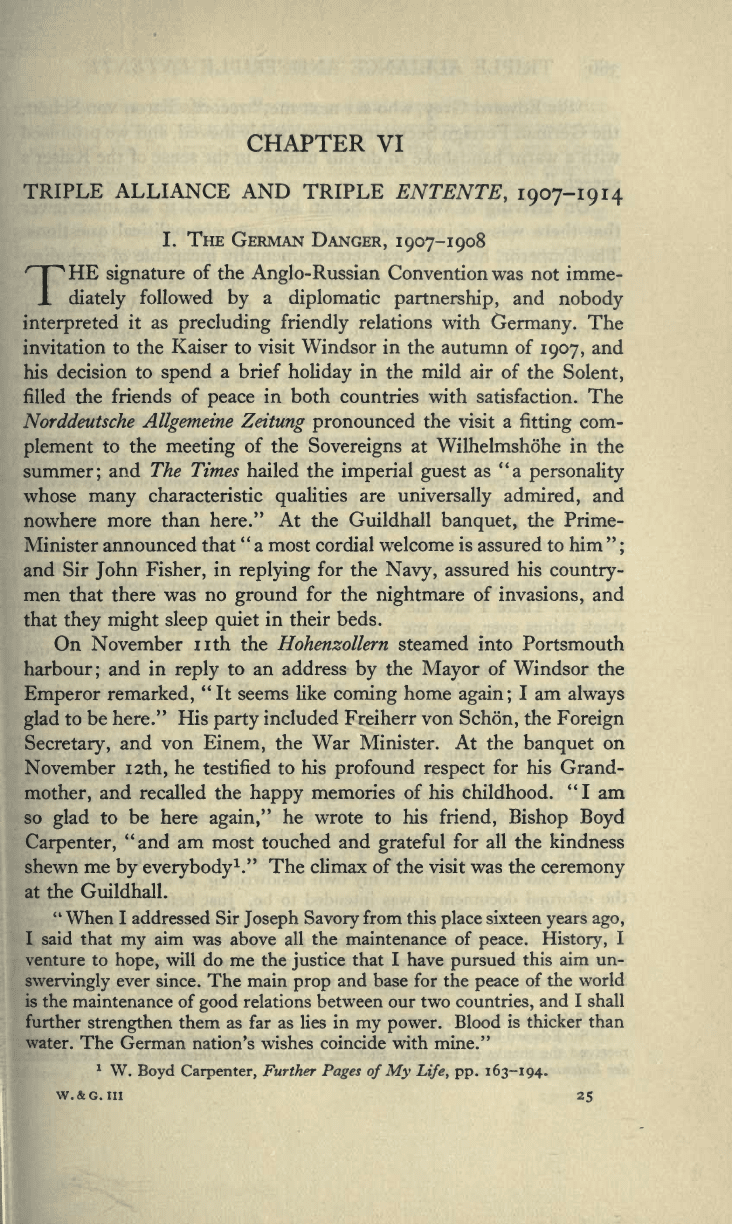
CHAPTER
VI
TRIPLE
ALLIANCE AND
TRIPLE
ENTENTE,
1907-1914
I.
The
German
Danger,
1907-
1908
THE
signature
of
the
Anglo-Russian
Convention
was
not imme-
diately
followed
by
a
diplomatic
partnership,
and
nobody
interpreted
it
as
precluding
friendly
relations
with
Germany.
The
invitation
to
the
Kaiser to visit
Windsor
in
the autumn
of
1907,
and
his
decision to
spend
a brief
holiday
in
the
mild air of
the
Solent,
filled the
friends
of
peace
in
both
countries
with
satisfaction.
The
Norddeutsche
Allgemeine Zeitung
pronounced
the visit
a
fitting
com-
plement
to the
meeting
of
the
Sovereigns
at Wilhelmshohe in
the
summer;
and The
Times
hailed
the
imperial guest
as "a
personality
whose
many
characteristic
qualities
are
universally
admired,
and
nowhere
more
than
here."
At the
Guildhall
banquet,
the
Prime-
Minister announced that
"
a
most
cordial welcome
is
assured to
him
"
;
and
Sir
John
Fisher,
in
replying
for
the
Navy,
assured his
country-
men
that there
was
no
ground
for
the
nightmare
of
invasions,
and
that
they might
sleep
quiet
in
their
beds.
On November
nth
the
Hohenzollern steamed
into Portsmouth
harbour;
and in
reply
to an
address
by
the
Mayor
of Windsor
the
Emperor
remarked,
"It
seems
like
coming
home
again;
I
am
always
glad
to
be here."
His
party
included Freiherr von
Schon,
the
Foreign
Secretary,
and
von
Einem,
the
War Minister.
At the
banquet
on
November
12th,
he
testified to
his
profound respect
for
his Grand-
mother,
and
recalled the
happy
memories of his
childhood. "I
am
so
glad
to be here
again,"
he
wrote
to his
friend,
Bishop
Boyd
Carpenter,
"and am most touched
and
grateful
for
all
the
kindness
shewn me
by
everybody
1
." The climax of
the
visit was
the
ceremony
at the Guildhall.
"
When
I
addressed
Sir
Joseph
Savory
from this
place
sixteen
years ago,
I
said
that
my
aim
was above all
the
maintenance
of
peace.
History,
I
venture
to
hope,
will
do
me
the
justice
that
I
have
pursued
this
aim un-
swervingly
ever
since.
The
main
prop
and
base for the
peace
of the
world
is
the
maintenance of
good
relations between
our
two
countries,
and I shall
further
strengthen
them as
far
as
lies
in
my power.
Blood
is thicker
than
water. The German
nation's wishes
coincide with mine."
1
W.
Boyd
Carpenter,
Further
Pages of
My
Life,
pp.
163-194.
w.&G. in
25
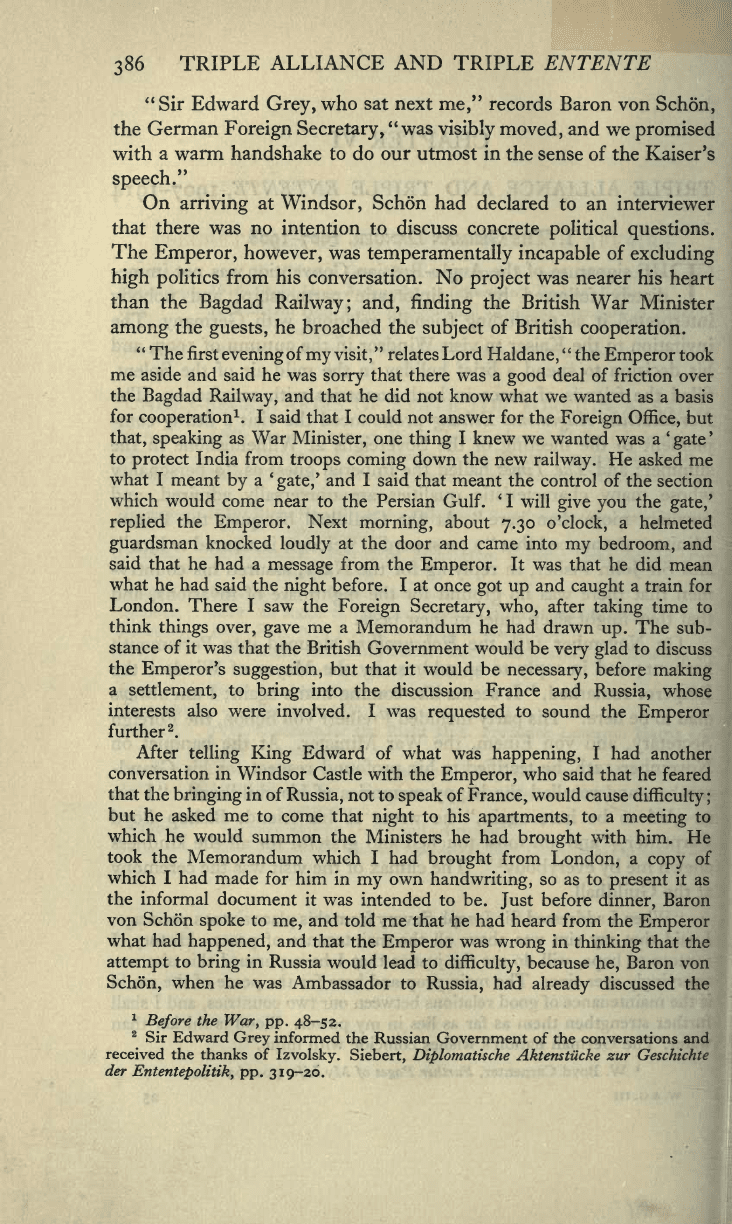
386
TRIPLE
ALLIANCE
AND
TRIPLE ENTENTE
"Sir
Edward
Grey,
who sat next
me,"
records Baron
von
Schon,
the
German
Foreign Secretary,
"
was
visibly
moved,
and
we
promised
with
a
warm handshake
to
do our utmost in
the
sense of the Kaiser's
speech."
On
arriving
at
Windsor,
Schon had
declared
to
an
interviewer
that there was no
intention to discuss
concrete
political
questions.
The
Emperor,
however,
was
temperamentally incapable
of
excluding
high
politics
from
his
conversation.
No
project
was
nearer his
heart
than
the
Bagdad
Railway;
and,
finding
the
British War
Minister
among
the
guests,
he broached the
subject
of
British
cooperation.
"
The first
eveningof my
visit,"
relates
Lord
Haldane,
"
the
Emperor
took
me
aside and
said he was
sorry
that
there
was a
good
deal
of
friction
over
the
Bagdad
Railway,
and that he did
not
know
what we
wanted as a
basis
for
cooperation
1
.
I
said that I could not
answer
for
the
Foreign
Office,
but
that,
speaking
as War
Minister,
one
thing
I
knew we wanted
was a
'gate'
to
protect
India from
troops coming
down the
new
railway.
He asked
me
what I
meant
by
a
'gate,'
and
I said
that meant the control of
the section
which would
come
near to the Persian
Gulf.
'
I
will
give you
the
gate,'
replied
the
Emperor.
Next
morning,
about
7.30
o'clock,
a
helmeted
guardsman
knocked
loudly
at the door and
came into
my
bedroom,
and
said that
he had a
message
from the
Emperor.
It was that
he
did
mean
what
he
had
said
the
night
before.
I
at
once
got up
and
caught
a train for
London. There
I
saw
the
Foreign Secretary,
who,
after
taking
time to
think
things
over,
gave
me a
Memorandum
he
had
drawn
up.
The sub-
stance of
it
was that the
British Government would
be
very glad
to
discuss
the
Emperor's
suggestion,
but that it would
be
necessary,
before
making
a
settlement,
to
bring
into
the discussion
France and
Russia,
whose
interests also
were
involved.
I
was
requested
to
sound
the
Emperor
further
2
.
After
telling
King
Edward of
what was
happening,
I had
another
conversation in
Windsor Castle with
the
Emperor,
who
said that he feared
that
the
bringing
in
of
Russia,
not to
speak
of
France,
would
cause
difficulty
;
but
he asked me to
come that
night
to his
apartments,
to a
meeting
to
which he would
summon
the Ministers he had
brought
with
him. He
took
the
Memorandum
which I had
brought
from
London,
a
copy
of
which I had
made
for him
in
my
own
handwriting,
so
as
to
present
it as
the informal
document it
was intended to
be.
Just
before
dinner,
Baron
von Schon
spoke
to
me,
and told
me that he had heard from
the
Emperor
what had
happened,
and
that
the
Emperor
was
wrong
in
thinking
that the
attempt
to
bring
in
Russia
would lead to
difficulty,
because
he,
Baron
von
Schon,
when he
was
Ambassador to
Russia,
had
already
discussed the
1
Before
the
War,
pp.
48-52.
2
Sir Edward
Grey
informed
the
Russian Government of the conversations
and
received
the thanks of
Izvolsky.
Siebert,
Diplomatische
Aktenstucke
zur Geschichte
der
Ententepolitikj
pp. 319-20.
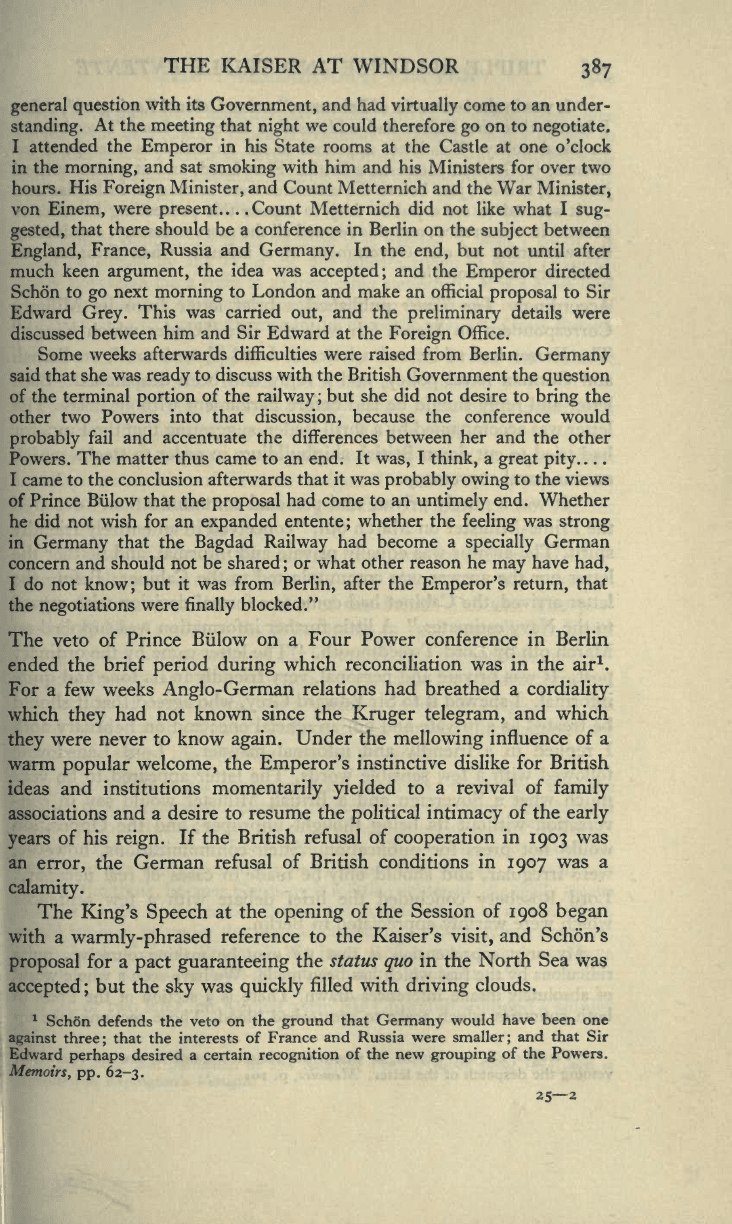
THE
KAISER AT
WINDSOR
387
general
question
with
its
Government,
and had
virtually
come to
an
under-
standing.
At
the
meeting
that
night
we could
therefore
go
on to
negotiate.
I attended
the
Emperor
in his
State rooms at the
Castle
at
one o'clock
in
the
morning,
and
sat
smoking
with him and
his Ministers for over two
hours.
His
Foreign
Minister,
and
Count
Metternich and the War
Minister,
von
Einem,
were
present
Count
Metternich
did
not like
what
I
sug-
gested,
that
there
should
be a
conference in
Berlin
on
the
subject
between
England,
France,
Russia and
Germany.
In the
end,
but not
until
after
much
keen
argument,
the
idea was
accepted;
and
the
Emperor
directed
Schon
to
go
next
morning
to
London and make an
official
proposal
to Sir
Edward
Grey.
This was carried
out,
and the
preliminary
details were
discussed
between
him and Sir
Edward
at
the
Foreign
Office.
Some weeks
afterwards difficulties were raised from
Berlin.
Germany
said
that she
was
ready
to discuss with the British
Government
the
question
of the
terminal
portion
of the
railway
;
but she
did
not
desire to
bring
the
other two Powers
into that
discussion,
because
the
conference would
probably
fail
and accentuate the differences between her
and
the
other
Powers.
The
matter thus
came to an end. It
was,
I
think,
a
great pity
I came
to
the
conclusion afterwards
that it was
probably owing
to the views
of Prince
Biilow that the
proposal
had
come
to an
untimely
end.
Whether
he
did
not wish
for an
expanded
entente;
whether the
feeling
was
strong
in
Germany
that the
Bagdad
Railway
had become
a
specially
German
concern and
should not be shared
;
or what other reason he
may
have
had,
I do not
know;
but it
was from
Berlin,
after the
Emperor's
return,
that
the
negotiations
were
finally
blocked."
The veto
of Prince
Biilow
on
a
Four Power conference in Berlin
ended the
brief
period
during
which reconciliation was
in
the air
1
.
For a few
weeks
Anglo-
German relations
had breathed a
cordiality
which
they
had not
known
since
the
Kruger
telegram,
and which
they
were never to
know
again.
Under
the
mellowing
influence
of a
warm
popular
welcome,
the
Emperor's
instinctive
dislike
for
British
ideas and
institutions
momentarily yielded
to
a revival
of
family
associations
and a
desire
to
resume the
political intimacy
of
the
early
years
of his
reign.
If
the
British
refusal
of
cooperation
in
1903
was
an
error,
the
German refusal
of
British conditions
in
1907
was
a
calamity.
The
King's
Speech
at the
opening
of
the Session
of
1908 began
with a
warmly-phrased
reference
to
the Kaiser's
visit,
and
Schon's
proposal
for a
pact
guaranteeing
the
status
quo
in
the North
Sea was
accepted;
but the
sky
was
quickly
filled with
driving
clouds.
1
Schon defends
the
veto
on the
ground
that
Germany
would
have
been
one
against
three;
that the interests
of
France
and
Russia were
smaller;
and that Sir
Edward
perhaps
desired
a certain
recognition
of the new
grouping
of the Powers.
Memoirs,
pp. 62-3.
25—2
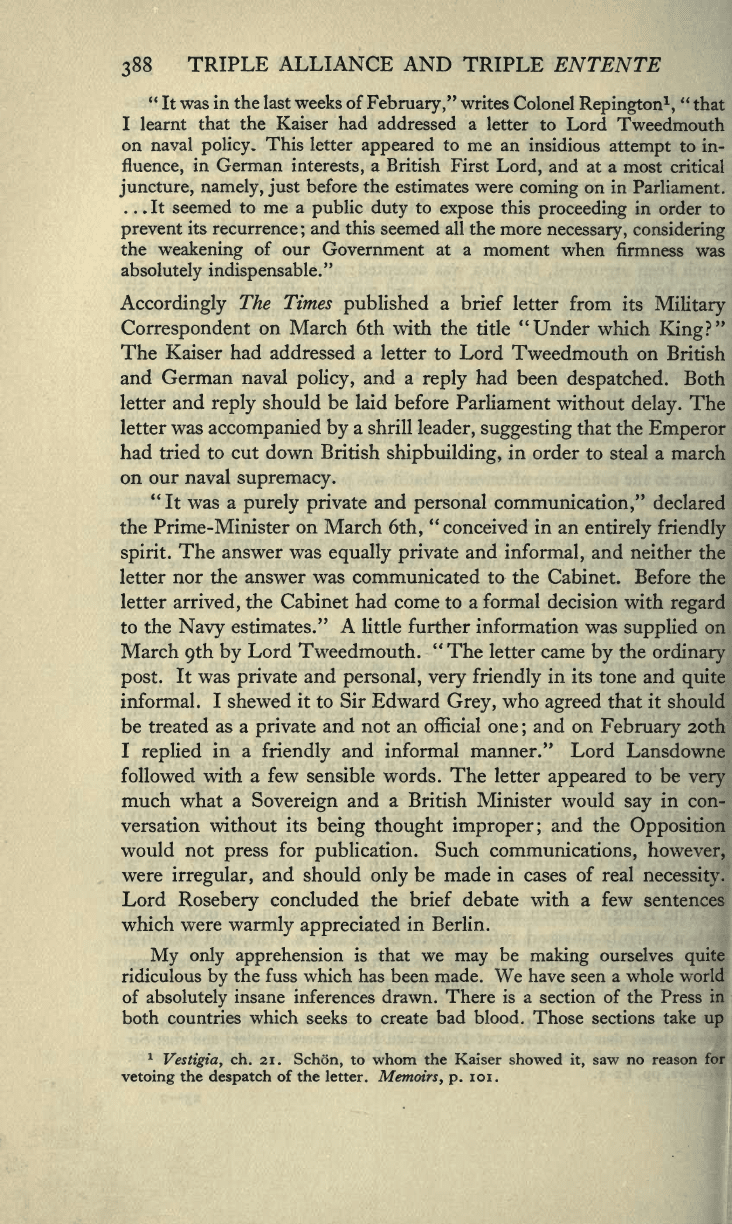
388
TRIPLE
ALLIANCE
AND
TRIPLE
ENTENTE
"
It
was
in the last
weeks
of
February,"
writes
Colonel
Repington
1
,
"
that
I learnt
that the Kaiser
had
addressed
a
letter
to Lord
Tweedmouth
on
naval
policy.
This
letter
appeared
to
me an
insidious
attempt
to in-
fluence,
in German
interests,
a
British First
Lord,
and
at
a
most
critical
juncture,
namely, just
before
the estimates
were
coming
on in
Parliament.
...
It seemed
to
me
a
public
duty
to
expose
this
proceeding
in
order to
prevent
its recurrence
;
and this
seemed all
the more
necessary, considering
the
weakening
of
our
Government at a
moment
when
firmness was
absolutely
indispensable."
Accordingly
The
Times
published
a
brief
letter from
its
Military
Correspondent
on March
6th with
the title
"Under
which
King?"
The Kaiser
had
addressed
a
letter to Lord
Tweedmouth on
British
and
German naval
policy,
and a
reply
had
been
despatched.
Both
letter
and
reply
should
be laid
before
Parliament
without
delay.
The
letter
was
accompanied
by
a shrill
leader,
suggesting
that
the
Emperor
had
tried to
cut
down
British
shipbuilding,
in
order
to steal
a
march
on
our naval
supremacy.
"It was
a
purely
private
and
personal
communication,"
declared
the Prime-Minister
on March
6th,
"conceived in an
entirely
friendly
spirit.
The
answer
was
equally
private
and
informal,
and
neither the
letter
nor the answer was
communicated to the
Cabinet. Before the
letter
arrived,
the Cabinet
had
come
to
a
formal
decision
with
regard
to the
Navy
estimates." A
little further information was
supplied
on
March
9th
by
Lord
Tweedmouth. "The letter came
by
the
ordinary
post.
It
was
private
and
personal,
very friendly
in
its tone and
quite
informal.
I
shewed it to
Sir Edward
Grey,
who
agreed
that
it
should
be treated
as
a
private
and
not
an official
one
;
and on
February
20th
I
replied
in
a
friendly
and informal manner." Lord
Lansdowne
followed with
a few sensible words. The
letter
appeared
to
be
very
much what
a
Sovereign
and a
British Minister would
say
in con-
versation without its
being thought
improper;
and
the
Opposition
would not
press
for
publication.
Such
communications,
however,
were
irregular,
and
should
only
be made
in
cases
of
real
necessity.
Lord
Rosebery
concluded the
brief
debate
with
a
few
sentences
which were
warmly appreciated
in
Berlin.
My only apprehension
is
that we
may
be
making
ourselves
quite
ridiculous
by
the
fuss which has been
made. We
have seen
a whole
world
of
absolutely
insane
inferences
drawn. There is a section
of
the Press
in
both
countries which
seeks to create
bad blood.
Those sections
take
up
1
Vestigia,
ch.
21.
Schon,
to whom the Kaiser showed
it,
saw no
reason
for
vetoing
the
despatch
of the
letter.
Memoirs, p.
101.
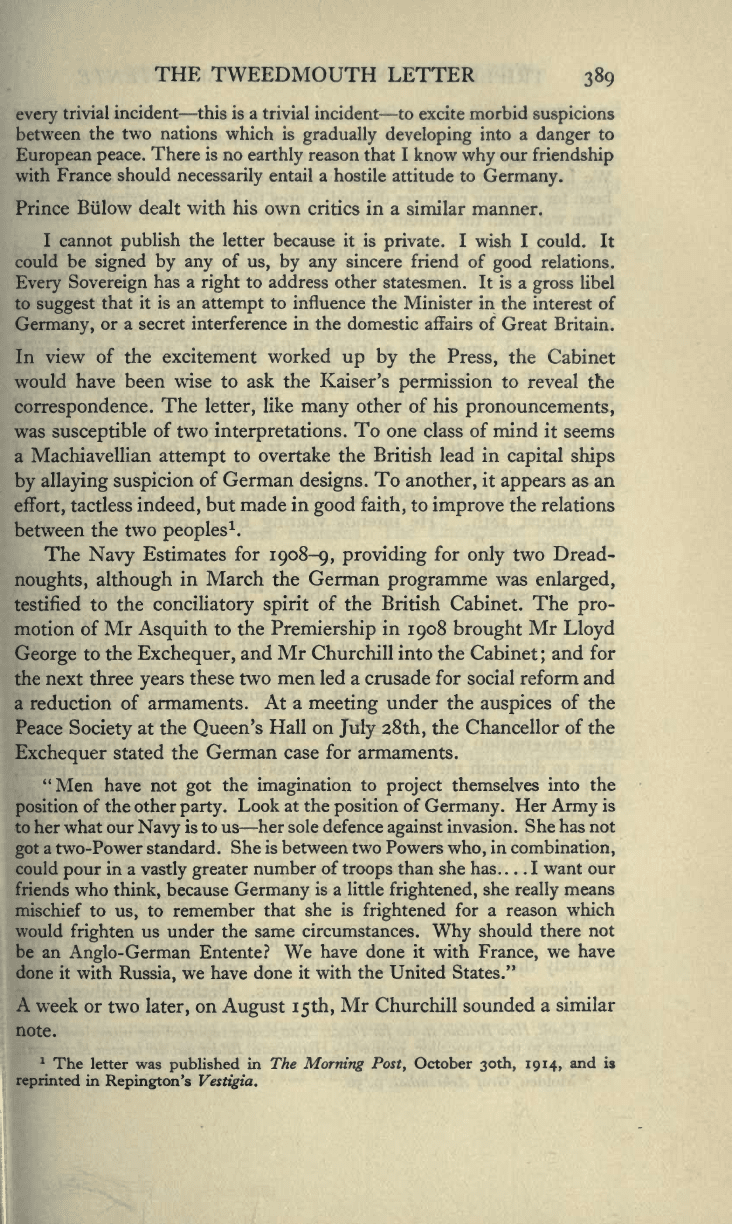
THE
TWEEDMOUTH LETTER
389
every
trivial
incident
—
this is a
trivial incident
—
to excite
morbid
suspicions
between
the two
nations which
is
gradually developing
into
a
danger
to
European peace.
There is no
earthly
reason
that
I
know
why
our
friendship
with
France
should
necessarily
entail a
hostile
attitude
to
Germany.
Prince
Bulow
dealt with his own
critics
in
a
similar manner.
I cannot
publish
the
letter because it is
private.
I
wish I
could. It
could
be
signed by any
of
us,
by
any
sincere
friend
of
good
relations.
Every Sovereign
has a
right
to address
other
statesmen. It is a
gross
libel
to
suggest
that
it is an
attempt
to
influence the
Minister
in
the interest of
Germany,
or a secret interference in the
domestic affairs of
Great
Britain.
In
view of
the
excitement worked
up
by
the
Press,
the
Cabinet
would
have been
wise
to
ask
the Kaiser's
permission
to reveal
the
correspondence.
The
letter,
like
many
other
of
his
pronouncements,
was
susceptible
of
two
interpretations.
To
one class
of mind
it seems
a
Machiavellian
attempt
to overtake the British lead
in
capital ships
by
allaying
suspicion
of
German
designs.
To
another,
it
appears
as
an
effort,
tactless
indeed,
but
made
in
good
faith,
to
improve
the relations
between the
two
peoples
1
.
The
Navy
Estimates
for
1908-9,
providing
for
only
two
Dread-
noughts, although
in March
the
German
programme
was
enlarged,
testified to the
conciliatory spirit
of
the British Cabinet.
The
pro-
motion
of Mr
Asquith
to the
Premiership
in
1908
brought
Mr
Lloyd
George
to the
Exchequer,
and
Mr
Churchill
into the Cabinet
;
and
for
the next three
years
these
two
men led a crusade for social reform and
a
reduction
of
armaments. At
a
meeting
under the
auspices
of
the
Peace
Society
at the
Queen's
Hall on
July
28th,
the
Chancellor
of
the
Exchequer
stated the
German case
for
armaments.
"Men
have
not
got
the
imagination
to
project
themselves
into the
position
of
the
other
party.
Look at the
position
of
Germany.
Her
Army
is
to her what our
Navy
is
to us
—
her sole defence
against
invasion.
She has not
got
a
two-Power standard.
She
is between two
Powers
who,
in
combination,
could
pour
in
a
vastly
greater
number
of
troops
than she
has I want
our
friends who
think,
because
Germany
is
a
little
frightened,
she
really
means
mischief to
us,
to remember
that
she is
frightened
for a reason
which
would
frighten
us under the
same circumstances.
Why
should there
not
be
an
Anglo-
German Entente?
We
have done it with
France,
we
have
done
it with
Russia,
we
have
done
it with the
United States."
A
week or
two
later,
on
August
15th,
Mr Churchill sounded
a
similar
note.
1
The
letter was
published
in
The
Morning Post,
October
30th,
19 14,
and
is
ited in
Repington's Vestigia.
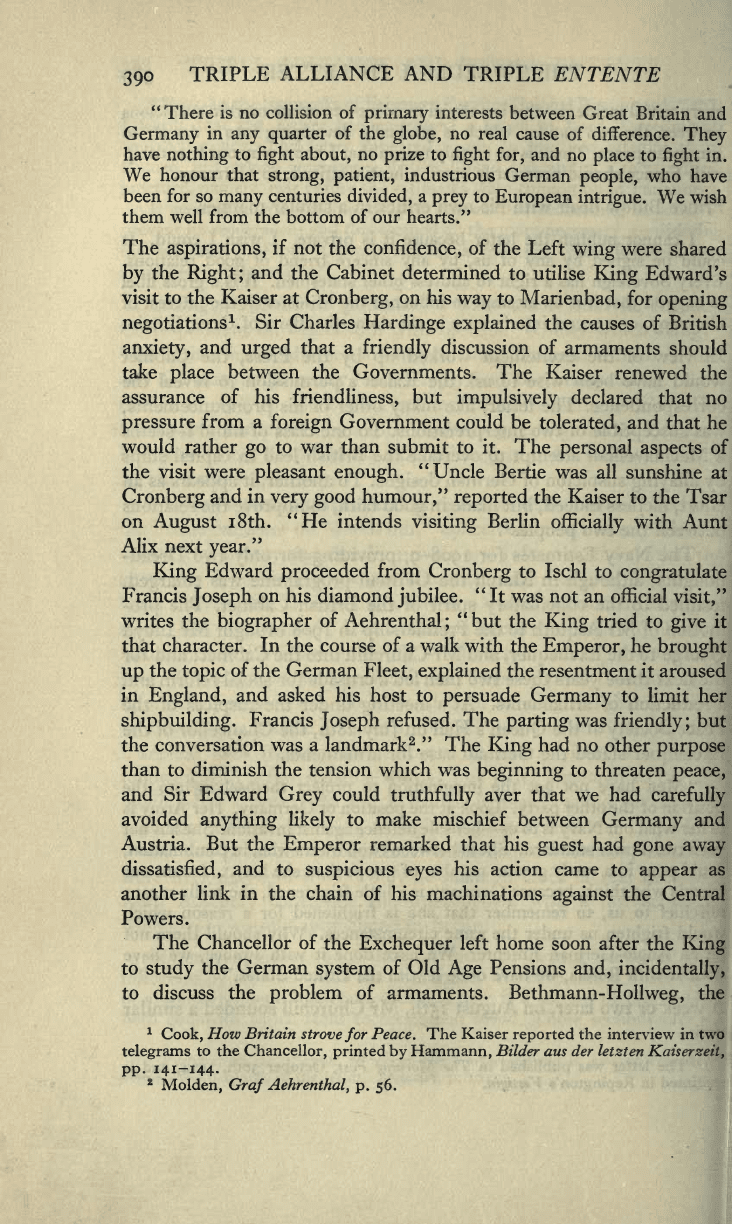
390
TRIPLE
ALLIANCE AND
TRIPLE
ENTENTE
"There
is no collision of
primary
interests
between Great
Britain
and
Germany
in
any quarter
of the
globe,
no
real
cause
of
difference.
They
have
nothing
to
fight
about,
no
prize
to
fight
for,
and
no
place
to
fight
in.
We
honour that
strong, patient,
industrious
German
people,
who have
been for so
many
centuries
divided,
a
prey
to
European
intrigue.
We wish
them well from the bottom of our
hearts."
The
aspirations,
if
not the
confidence,
of
the
Left
wing
were
shared
by
the
Right;
and
the Cabinet
determined to
utilise
King
Edward's
visit
to the Kaiser at
Cronberg,
on
his
way
to
Marienbad,
for
opening
negotiations
1
.
Sir Charles
Hardinge
explained
the
causes of
British
anxiety,
and
urged
that
a
friendly
discussion of
armaments
should
take
place
between
the
Governments.
The
Kaiser
renewed
the
assurance
of
his
friendliness,
but
impulsively
declared
that
no
pressure
from
a
foreign
Government
could be
tolerated,
and
that he
would rather
go
to
war
than submit to it. The
personal
aspects
of
the visit
were
pleasant
enough.
"Uncle
Bertie was all
sunshine
at
Cronberg
and
in
very good
humour,"
reported
the Kaiser
to
the
Tsar
on
August
1
8th. "He
intends
visiting
Berlin
officially
with
Aunt
Alix
next
year."
King
Edward
proceeded
from
Cronberg
to
Ischl
to
congratulate
Francis
Joseph
on his
diamond
jubilee.
"
It was
not
an official
visit,"
writes the
biographer
of
Aehrenthal;
"but the
King
tried
to
give
it
that character.
In
the
course of a
walk with
the
Emperor,
he
brought
up
the
topic
of
the German
Fleet,
explained
the
resentment it aroused
in
England,
and asked
his
host to
persuade
Germany
to
limit
her
shipbuilding.
Francis
Joseph
refused.
The
parting
was
friendly;
but
the
conversation was
a landmark
2
."
The
King
had no
other
purpose
than to
diminish
the tension which was
beginning
to threaten
peace,
and
Sir
Edward
Grey
could
truthfully
aver
that we
had
carefully
avoided
anything likely
to make mischief
between
Germany
and
Austria. But the
Emperor
remarked that
his
guest
had
gone away
dissatisfied,
and
to
suspicious
eyes
his
action
came
to
appear
as
another
link in
the chain of
his machinations
against
the
Central
Powers.
The Chancellor
of
the
Exchequer
left
home soon
after the
King
to
study
the
German
system
of
Old
Age
Pensions
and,
incidentally,
to
discuss
the
problem
of armaments.
Bethmann-Hollweg,
the
1
Cook,
How
Britain
strove
for
Peace.
The Kaiser
reported
the interview in
two
telegrams
to the
Chancellor,
printed by
Hammann,
Bilder aus
der
letzten
Kaiserzeit,
pp.
141-144.
2
Molden, Graf Aehrenthal,
p. 56.
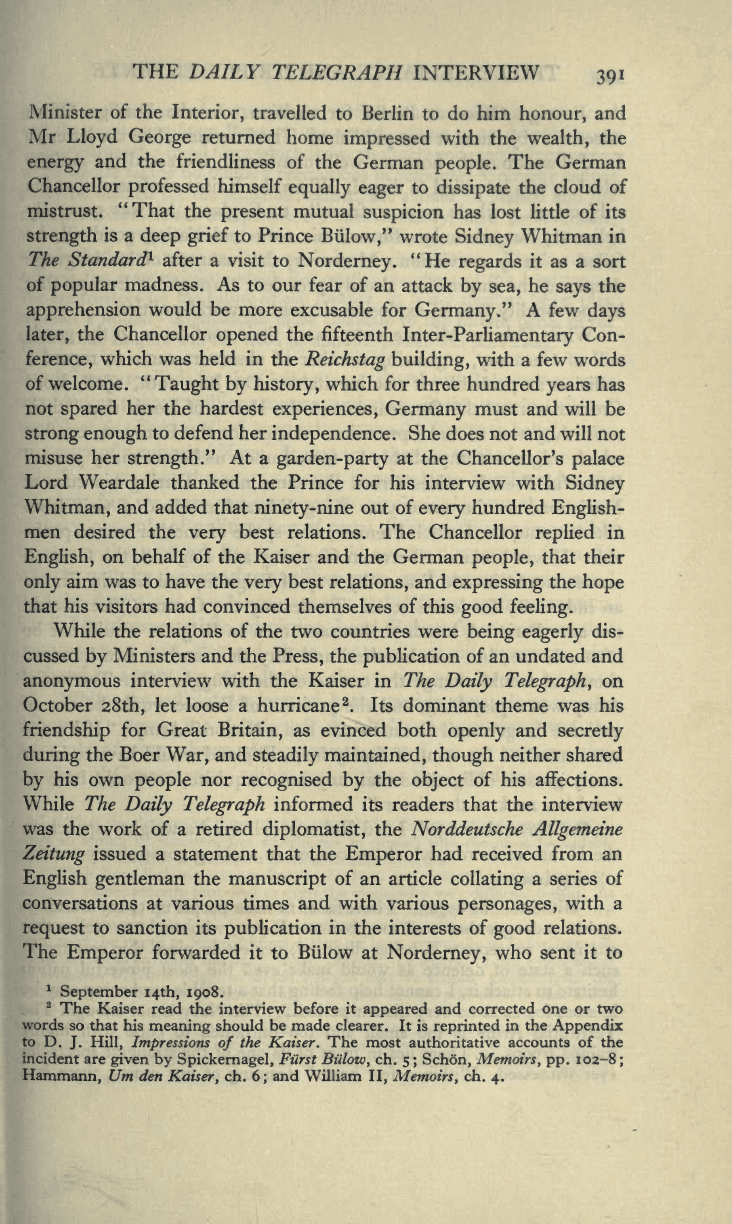
THE
DAILY
TELEGRAPH INTERVIEW
391
Minister
of the
Interior,
travelled
to Berlin
to
do him
honour,
and
Mr
Lloyd George
returned
home
impressed
with the
wealth,
the
energy
and the
friendliness
of
the
German
people.
The German
Chancellor
professed
himself
equally
eager
to
dissipate
the
cloud of
mistrust. "That
the
present
mutual
suspicion
has lost little
of
its
strength
is a
deep
grief
to Prince
Bulow,"
wrote
Sidney
Whitman
in
The Standard
1
after
a
visit to
Norderney.
"He
regards
it as a sort
of
popular
madness. As
to
our
fear of an
attack
by
sea,
he
says
the
apprehension
would
be
more
excusable
for
Germany.'
'
A
few
days
later,
the
Chancellor
opened
the
fifteenth
Inter-Parliamentary
Con-
ference,
which was held in
the
Reichstag
building,
with
a
few words
of
welcome.
"Taught
by history,
which for
three hundred
years
has
not
spared
her
the hardest
experiences,
Germany
must
and will
be
strong enough
to
defend her
independence.
She does
not
and will
not
misuse her
strength."
At a
garden-party
at the Chancellor's
palace
Lord Weardale
thanked the Prince for his
interview
with
Sidney
Whitman,
and added
that
ninety-nine
out
of
every
hundred
English-
men desired
the
very
best relations.
The Chancellor
replied
in
English,
on
behalf
of
the
Kaiser and
the
German
people,
that their
only
aim
was to
have
the
very
best
relations,
and
expressing
the
hope
that his
visitors
had
convinced
themselves
of
this
good feeling.
While
the relations
of
the two
countries
were
being eagerly
dis-
cussed
by
Ministers
and
the
Press,
the
publication
of
an undated
and
anonymous
interview with the Kaiser
in
The
Daily Telegraph,
on
October
28th,
let
loose a
hurricane
2
. Its
dominant
theme
was
his
friendship
for
Great
Britain,
as
evinced
both
openly
and
secretly
during
the
Boer
War,
and
steadily
maintained,
though
neither
shared
by
his own
people
nor
recognised
by
the
object
of
his
affections.
While
The
Daily Telegraph
informed
its readers that the interview
was
the work of a
retired
diplomatist,
the
Norddeutsche
Allgemeine
Zeitung
issued
a
statement that
the
Emperor
had
received
from an
English
gentleman
the
manuscript
of an
article
collating
a
series
of
conversations
at various
times
and
with various
personages,
with
a
request
to
sanction its
publication
in
the interests
of
good
relations.
The
Emperor
forwarded it to
Bulow
at
Norderney,
who sent it
to
1
September
14th, 1908.
2
The
Kaiser read the
interview
before it
appeared
and
corrected one or two
words
so that his
meaning
should be
made
clearer. It is
reprinted
in
the
Appendix
to
D.
J.
Hill,
Impressions of
the Kaiser.
The
most
authoritative
accounts of the
incident are
given
by Spickernagel,
Fiirst
Biilozv,
ch.
5 ; Schon,
Memoirs,
pp.
102-8
;
Hammann,
Um den
Kaiser,
ch.
6;
and
William
II,
Memoirs,
ch.
4.
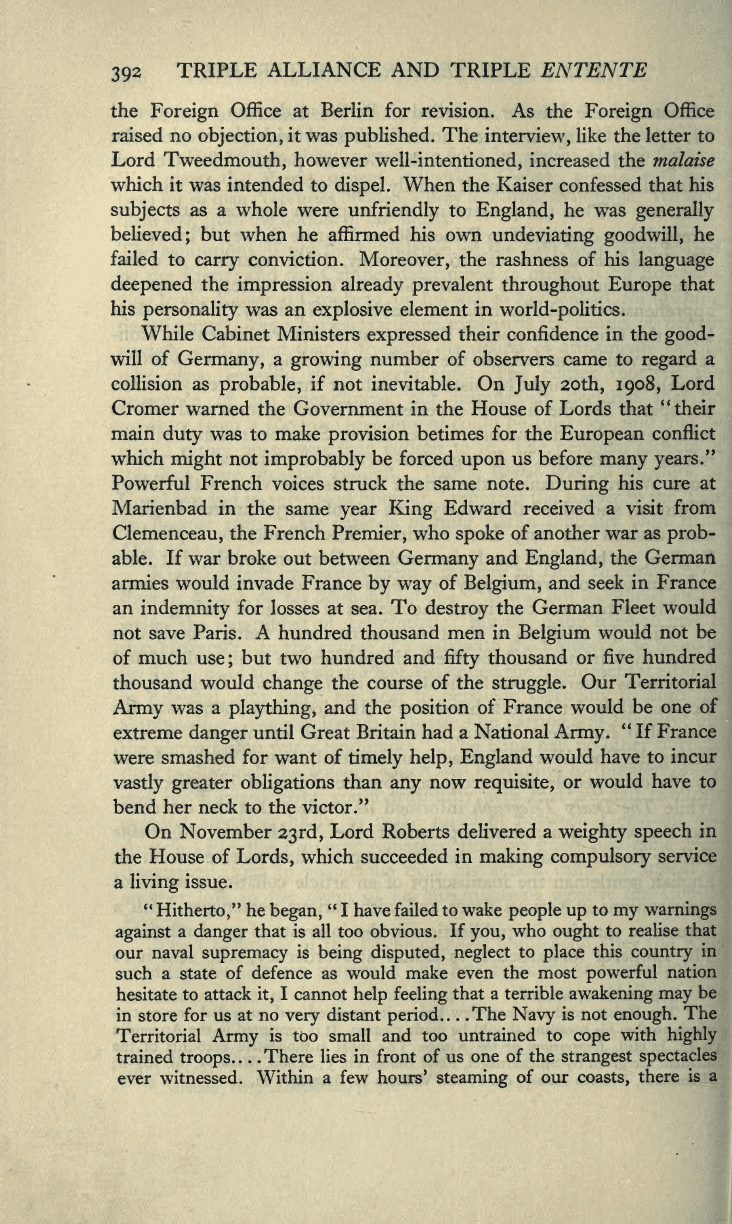
392
TRIPLE
ALLIANCE AND
TRIPLE ENTENTE
the
Foreign
Office
at Berlin
for
revision. As
the
Foreign
Office
raised
no
objection,
it
was
published.
The
interview,
like
the
letter to
Lord
Tweedmouth,
however
well-intentioned,
increased the
malaise
which
it
was
intended to
dispel.
When the Kaiser
confessed
that
his
subjects
as a
whole were
unfriendly
to
England,
he was
generally
believed;
but
when he affirmed his own
undeviating goodwill,
he
failed
to
carry
conviction.
Moreover,
the rashness
of
his
language
deepened
the
impression already prevalent
throughout
Europe
that
his
personality
was
an
explosive
element
in
world-politics.
While
Cabinet Ministers
expressed
their confidence
in
the
good-
will
of
Germany,
a
growing
number of
observers
came
to
regard
a
collision as
probable,
if
not inevitable. On
July
20th,
1908,
Lord
Cromer
warned the Government
in
the House
of Lords that
"their
main
duty
was to
make
provision
betimes for the
European
conflict
which
might
not
improbably
be
forced
upon
us before
many years."
Powerful French voices struck the same note.
During
his cure at
Marienbad in
the same
year
King
Edward received
a visit
from
Clemenceau,
the French
Premier,
who
spoke
of another war
as
prob-
able.
If war
broke out between
Germany
and
England,
the German
armies
would invade France
by
way
of
Belgium,
and
seek in
France
an
indemnity
for
losses at sea.
To
destroy
the
German Fleet
would
not save Paris.
A
hundred thousand
men in
Belgium
would not
be
of much
use
;
but two
hundred and
fifty
thousand
or five
hundred
thousand
would
change
the
course
of
the
struggle.
Our Territorial
Army
was
a
plaything,
and
the
position
of France would
be one
of
extreme
danger
until
Great
Britain
had a National
Army.
"
If
France
were smashed
for
want
of
timely
help,
England
would
have to
incur
vastly greater obligations
than
any
now
requisite,
or would
have
to
bend her neck
to the victor."
On
November
23rd,
Lord Roberts
delivered a
weighty
speech
in
the
House
of
Lords,
which succeeded
in
making
compulsory
service
a
living
issue.
"
Hitherto,"
he
began,
"
I have failed
to
wake
people
up
to
my
warnings
against
a
danger
that is
all
too obvious.
If
you,
who
ought
to realise
that
our
naval
supremacy
is
being disputed,
neglect
to
place
this
country
in
such a state
of defence as would make
even
the most
powerful
nation
hesitate
to attack
it,
I
cannot
help
feeling
that
a
terrible
awakening
may
be
in
store
for us
at no
very
distant
period
The
Navy
is
not
enough.
The
Territorial
Army
is too
small
and too
untrained
to
cope
with
highly
trained
troops
There
lies
in
front of us
one of the
strangest
spectacles
ever
witnessed.
Within
a
few hours'
steaming
of
our
coasts,
there
is
a
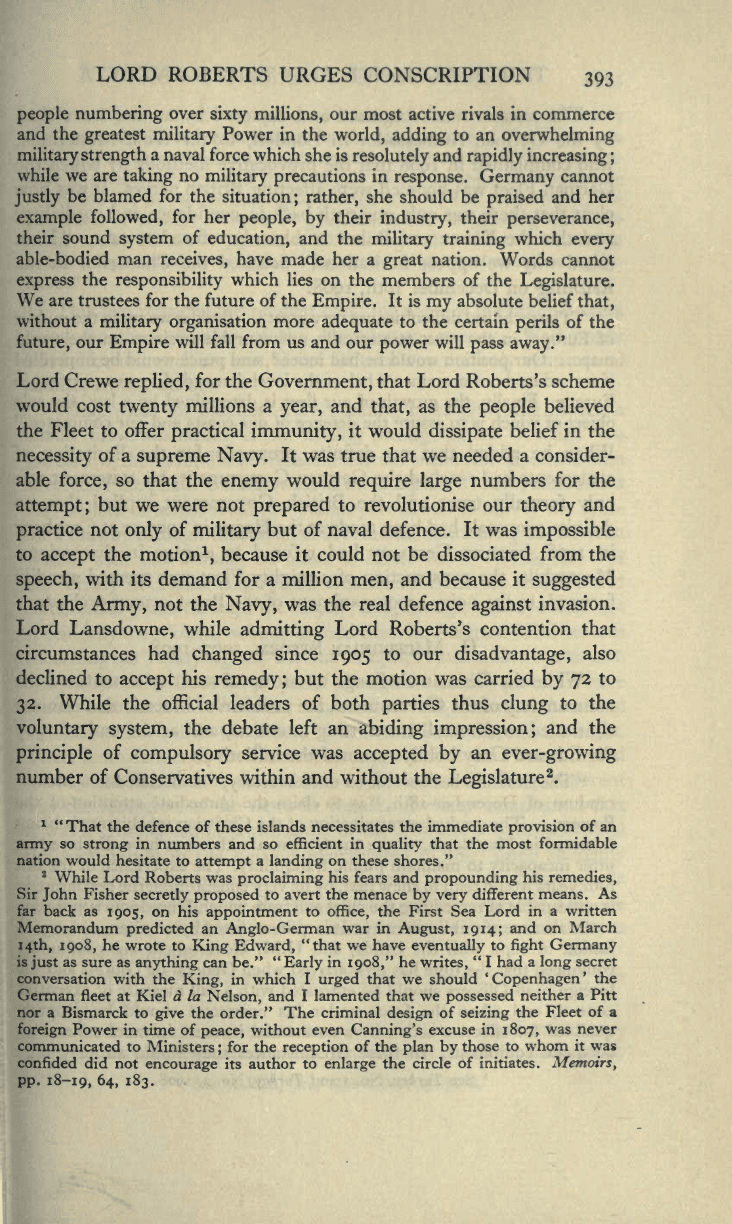
LORD
ROBERTS
URGES
CONSCRIPTION
393
people
numbering
over
sixty
millions,
our
most active rivals
in
commerce
and the
greatest
military
Power in the
world,
adding
to an
overwhelming
military strength
a
naval
force which she
is
resolutely
and
rapidly
increasing
;
while we are
taking
no
military precautions
in
response. Germany
cannot
justly
be blamed for
the
situation;
rather,
she
should be
praised
and her
example
followed,
for
her
people,
by
their
industry,
their
perseverance,
their sound
system
of
education,
and
the
military
training
which
every
able-bodied
man
receives,
have made her a
great
nation. Words cannot
express
the
responsibility
which lies on
the
members
of
the
Legislature.
We are
trustees
for
the future
of
the
Empire.
It is
my
absolute
belief
that,
without a
military
organisation
more
adequate
to
the certain
perils
of the
future,
our
Empire
will fall from us and
our
power
will
pass away."
Lord
Crewe
replied,
for
the
Government,
that Lord
Roberts's
scheme
would
cost
twenty
millions a
year,
and
that,
as the
people
believed
the Fleet to offer
practical
immunity,
it
would
dissipate
belief
in
the
necessity
of a
supreme
Navy.
It
was
true
that
we needed
a consider-
able
force,
so
that the
enemy
would
require large
numbers for
the
attempt;
but we
were not
prepared
to
revolutionise
our
theory
and
practice
not
only
of
military
but
of naval
defence. It
was
impossible
to
accept
the motion
1
,
because it
could
not
be
dissociated
from the
speech,
with
its demand
for
a
million
men,
and because it
suggested
that the
Army,
not the
Navy,
was
the
real defence
against
invasion.
Lord
Lansdowne,
while
admitting
Lord
Roberts's contention
that
circumstances
had
changed
since
1905
to
our
disadvantage,
also
declined
to
accept
his
remedy
;
but
the motion
was carried
by
72
to
32.
While
the
official
leaders
of
both
parties
thus
clung
to the
voluntary
system,
the
debate
left
an
abiding
impression;
and the
principle
of
compulsory
service was
accepted by
an
ever-growing
number of
Conservatives
within
and
without the
Legislature
2
.
1
"That the
defence
of
these
islands
necessitates the
immediate
provision
of
an
army
so
strong
in
numbers
and so efficient in
quality
that the
most formidable
nation would
hesitate
to
attempt
a
landing
on these
shores."
2
While Lord
Roberts
was
proclaiming
his fears
and
propounding
his
remedies,
Sir
John
Fisher
secretly
proposed
to
avert the menace
by very
different means.
As
far back
as
1905,
on his
appointment
to
office,
the
First
Sea Lord
in
a written
Memorandum
predicted
an
Anglo-German
war
in
August,
1914;
and
on
March
14th,
1908,
he
wrote
to
King
Edward,
"that
we
have
eventually
to
fight
Germany
is
just
as sure as
anything
can
be."
"
Early
in
1908,"
he
writes,
"
I had
a
long
secret
conversation
with
the
King,
in which
I
urged
that we
should
'Copenhagen'
the
German
fleet at Kiel a la
Nelson,
and I
lamented
that we
possessed
neither
a
Pitt
nor a
Bismarck
to
give
the
order."
The
criminal
design
of
seizing
the
Fleet
of a
foreign
Power in
time of
peace,
without
even
Canning's
excuse
in
1807,
was never
communicated to
Ministers
;
for the
reception
of
the
plan by
those
to
whom it
was
confided
did
not
encourage
its
author
to
enlarge
the circle
of initiates.
Memoirs,
pp.
18-19,
64> 183.
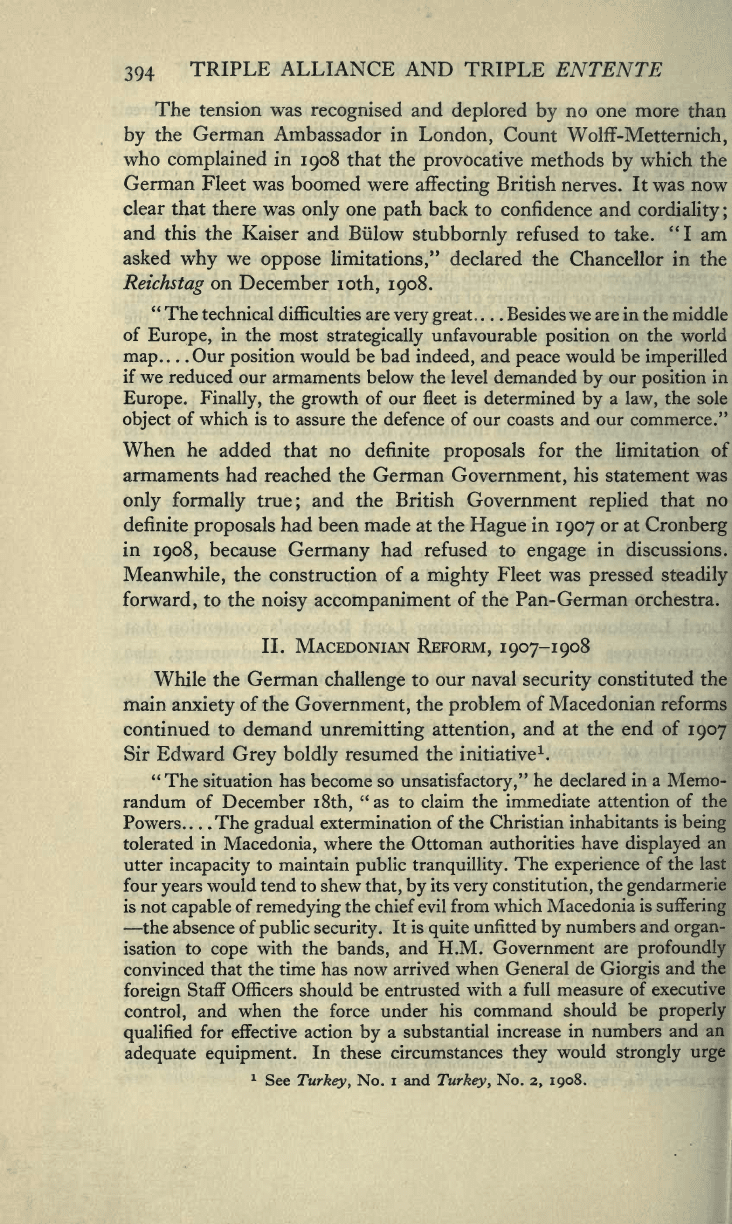
394
TRIPLE ALLIANCE AND
TRIPLE ENTENTE
The tension
was
recognised
and
deplored
by
no one more
than
by
the
German
Ambassador in
London,
Count
WolfT-Metternich,
who
complained
in
1908
that
the
provocative
methods
by
which the
German
Fleet
was
boomed were
affecting
British
nerves.
It
was now
clear
that
there was
only
one
path
back
to confidence
and
cordiality
;
and
this the Kaiser and Bulow
stubbornly
refused
to take.
"I
am
asked
why
we
oppose
limitations,
"
declared
the Chancellor
in
the
Reichstag
on
December
10th,
1908.
"
The
technical difficulties are
very
great
Besides we
are
in the middle
of
Europe,
in
the most
strategically
unfavourable
position
on the
world
map
Our
position
would
be
bad
indeed,
and
peace
would be
imperilled
if
we reduced our
armaments below the level
demanded
by
our
position
in
Europe. Finally,
the
growth
of our fleet
is determined
by
a
law,
the sole
object
of
which is to
assure the defence
of
our coasts and
our
commerce."
When he
added
that
no
definite
proposals
for
the limitation
of
armaments
had
reached the German
Government,
his
statement
was
only
formally
true;
and
the British
Government
replied
that
no
definite
proposals
had been
made at
the
Hague
in
1907
or
at
Cronberg
in
1908,
because
Germany
had refused to
engage
in discussions.
Meanwhile,
the
construction of a
mighty
Fleet was
pressed steadily
forward,
to the
noisy
accompaniment
of
the
Pan-German orchestra.
II.
Macedonian
Reform,
1
907-1
908
While the
German
challenge
to
our naval
security
constituted
the
main
anxiety
of
the
Government,
the
problem
of Macedonian reforms
continued
to
demand
unremitting
attention,
and at the
end
of
1907
Sir
Edward
Grey
boldly
resumed the
initiative
1
.
"
The situation has
become so
unsatisfactory,"
he declared
in a Memo-
randum
of
December
18th,
"as to claim
the immediate
attention
of the
Powers
The
gradual
extermination
of the
Christian
inhabitants
is
being
tolerated in
Macedonia,
where the
Ottoman
authorities have
displayed
an
utter
incapacity
to maintain
public
tranquillity.
The
experience
of the
last
four
years
would tend to
shew
that,
by
its
very
constitution,
the
gendarmerie
is not
capable
of
remedying
the chief evil
from
which Macedonia
is
suffering
—
the absence
of
public
security.
It is
quite
unfitted
by
numbers
and
organ-
isation
to
cope
with
the
bands,
and H.M.
Government are
profoundly
convinced
that the time has
now arrived
when General
de
Giorgis
and
the
foreign
Staff
Officers
should be
entrusted
with a
full measure
of
executive
control,
and when
the
force under
his
command should
be
properly
qualified
for effective action
by
a substantial
increase
in numbers
and
an
adequate
equipment.
In these circumstances
they
would
strongly
urge
1
See
Turkey,
No.
1
and
Turkey,
No.
2,
1908.
